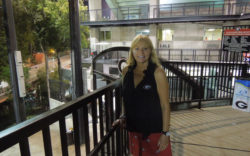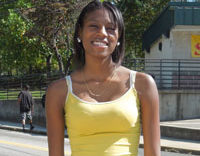Flagpole: What grade do you teach?
Tammy Lee: Well, I’ve been teaching eighth grade for many years, and have been teaching either science or math, and this upcoming school year I’m going to be teaching sixth grade Earth science.
FP: And where do you teach?
TL: I teach at Carver Middle School in Walton County.
FP: So, you’re transitioning to teaching a totally different grade. Is that a little nerve-wracking?
TL: I’m a little bit nervous; I haven’t taught sixth graders since about 2004, 2005. And year before last, I tried it just a little bit when they had me go between two grade levels for about two weeks: I was doing an eighth grade math class and then running to a sixth grade math class and then back to eighth grade. And for about two weeks, I got a little bit of time with the sixth graders, but I quickly realized I had been taking for granted what eighth graders automatically knew.
FP: Because sixth graders are new to middle school.
TL: Yes, the sixth graders are completely new, and it’s a whole new transition for them, as well, and to another stage of their life. So, I mean, sweet kids, but you just… I knew if I had spent more time with them, I would be more familiar with what they were capable of. But, I was just there for a brief moment until we hired a new teacher and I could just stay in one grade level. It was a little concerning for me.
FP: How long have you been a teacher?
TL: Ten years… Actually, I worked on a psychology degree, and my ambition was to be a school counselor, and still is. And what I did is, [I] got a degree in psychology, and then did a one-year practicum and worked with special ed for many years… [This will be] my fourth year that I will have been doing regular education versus special ed and doing Resource and Collab. But, I wanted to do education, and I’m still working on my master’s to do the school counseling. But I felt like, to be a good counselor, I needed a good understanding of teachers and students now.
FP: And what kind of knowledge do you think you’ve gained from being a teacher?
TL: I quickly understood that kids are not anything like I remember when I was going to school. I quickly understood why certain kids were off in the corner, or why those kids’ clothes were always dirty or tattered and torn, and why some kids were stand-offish. And it wasn’t until I started teaching that I understood it was those kids that had different circumstances at home: either parents who were not involved—which was totally opposite from my parents—or kids who didn’t have the basic necessities, which was something I was not very familiar with. So, it was a huge awakening for me… But, those are the kids that needed more nurturing and more understanding…
We’ve got kids who just recently were used to having a parent home, because they had a stay-at-home parent, who is now working. And then, we’ve got kids whose parents may have only worked one job that are now working multiple jobs, so it’s a huge change for [the kids]. So, you know, behaviors have changed through that… But, you’ve just got to learn how to work with it and understand what’s going on, and still keep a good relationship with those parents who want to be involved, but their time has changed.
FP: Have you noticed any negative effects [from the impact of a bad economy] as a teacher?
TL: Well, you’ve got more kids who are without supplies more often now… When I went from teaching in a school that was not a Title I school, which meant a high socioeconomic status [Title I schools receive government assistance if at least 40 percent of students are from low-income families], to… teaching in a Title I school, I quickly realized how many supplies I go through. And I just don’t let that be an excuse for my kids; if they need paper, if they need pencils, it’s there… The fact is that some of them are going home to empty houses, so they’re not doing as much of their homework or studying as much as they normally would have.
So, we have parents that say that their kids’ grades have dropped—and they know it’s because they’re not at home. And we try not to give much homework… I’m more concerned with them getting as much as they can in class, because of not having the support at home.
FP: Well, you’re clearly a very devoted teacher.
TL: I enjoy my kids.
FP: And I’m sure you spend a ton of time working. [Tammy, her friend and I all laugh.] My mom is a first grade teacher, so I’ve seen it in action. But do you ever get a chance to do other things? What else do you enjoy doing?
TL: You know, I enjoy traveling. I enjoy times with my friends and my husband—he is also a teacher in high school in another county—and we get a good bit of time together when I’m not spending more of my time grading papers. I spend a good bit of time on weekends and things like that. But, when I get the time, we like to travel… And then of course, things like this: [my friends and I] come and sit and read at the bookstore, or go and do stuff and look around.
FP: Where have you been that has been the most interesting or notable?
TL: I would have to say the most interesting place I’ve been would be probably our drive back from California one year. We actually flew out to San Francisco and drove back, cross-country, stopping and doing a few things, looking at things. And I got to see parts of the western part of the United States that I had not seen… And besides the concern with rattlesnakes, I would probably have to say New Mexico was one of the most beautiful states that I had visited, as well as Wyoming. You know, just the countryside, and the scenery and the breath of fresh air.
And, of course, [in] New Mexico, we were kind of down, like, in a valley, with the mountains around us and all the stars—it was just [she whispers] a blanket. And, I said, even though I was terrified of rattlesnakes, I still thought I could go sleep out on a hammock, you know, and just lie out there all night under the stars, and be happy.
Like what you just read? Support Flagpole by making a donation today. Every dollar you give helps fund our ongoing mission to provide Athens with quality, independent journalism.










